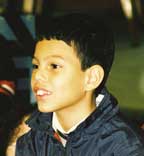About Us

FHI 360’s Center for School and Community Services uses multidisciplinary approaches to address critical issues in education, health, and youth development in the United States. Our work is informed by the core values of equity, excellence, collaboration, and democratic participation. We are guided by a vision of families, youth, community members, and professionals working in partnership to develop and promote effective programs and services.
To achieve our goals, we provide technical assistance to strengthen schools, school districts, and community-based organizations. We conduct evaluations of school and community programs while striving to provide the skills and impetus for practitioners to undertake ongoing assessment and improvement. We manage large-scale initiatives to strengthen practitioner networks and accelerate systems change. We use the knowledge gained from our work to advocate for effective policies and practices and disseminate information on line and through publications and presentations. The Center for School and Community Services is part of FHI 360’s U.S. Education and Workforce Development Group.
In 2005, the Educational Equity Center (EEC) was formed. The Center is an outgrowth of Educational Equity Concepts, a national nonprofit organization with a 22-year history of addressing educational excellence for all children regardless of gender, race/ethnicity, disability, or level of family income. EEC's goal is to ensure that equity is a key focus within national reform efforts to ensure equality of opportunity in schools and afterschool settings, starting in early childhood. EEC's current work is on this site's project pages. For more information, go to edequity.org.
See Projects for brief descriptions of projects mentioned on this page.
All employment opportunities in the Center for School and Community Services are announced on the main FHI 360 website.
For more information about FHI 360’s Center for School and Community Services, contact Patrick Montesano, vice president and director, at 212-367-4573 or pmontesano@fhi360.org.
What We Do
Program Design and Management | Technical Assistance and Professional Development | Documentation and Evaluation | Dissemination and Public Engagement
Program Design and Management

The Center for School and Community Services designs, implements, and manages programs addressing critical issues affecting youth and families. We have developed initiatives that help middle-grades and high schools and school districts undertake comprehensive reform initiatives; improve the mathematics and science education of minority and female students; meet the needs of pregnant and parenting teens; prepare youth for the workplace; and institutionalize service-learning as a core element of the education of all students.
We have also designed programs to increase access to and success inhigher education among underserved populations; increase the capacity of school and program staff to engage in self-assessment and inquiry; increase awareness of, access to, and appropriate use of emergency contraception by adolescents; and improve the training of out-of-school youth in youth employment programs.
Increasingly, this work entails comprehensive initiatives involving several types of work: program development and management; technical assistance and capacity building; evaluation; dissemination and public engagement; and advocacy. Currently these comprehensive initiatives include our work as the Middle Start National Center, the Citi Postsecondary Success Program,, and Succeed 2020, North Dakota’s education and workforce development initiative.
top of page
Technical Assistance and Professional Development
 For example, the Center is currently working as a Partnership Support Organization, funded by the New York City Department of Education, with 14schools in New York City, drawing on the expertise of the Middle Start National Center, to help schools ensure student success and a smooth transition across the education pipeline. Middle Start has also worked with over 200 schools and districts in 10 states.
For example, the Center is currently working as a Partnership Support Organization, funded by the New York City Department of Education, with 14schools in New York City, drawing on the expertise of the Middle Start National Center, to help schools ensure student success and a smooth transition across the education pipeline. Middle Start has also worked with over 200 schools and districts in 10 states.
In our Schools for a New Society Technical Support Team, the Center collaborated with the Annenberg Institute for School Reform to support the seven partnerships funded by the Carnegie Corporation of New York to transform their secondary schools. We facilitated a "learning network" to foster cross-site learning among the seven sites, as well as conferences and "critical friends" trips to foster cross-district networking. Center staff also have extensive experience developing and providing technical assistance to many school-based and community programs, including programs to foster the science, mathematics, engineering, and technology (STEM) education and achievement of female and minority students, as well as students with disabilities. Current STEM projects include Afterschool Math Plus Implementation and Replication, Great Science for Girls: Extension Services for Gender Equity in Science through Afterschool Programs, and Playtime is Science for Students with Disabilities.
The Center has also worked extensively in developing and promoting inquiry approaches to help schools build a reflective culture focused on the improvement of teaching and learning. This includes the work of our work in school self- Reviewing Student Work/Improving Student Achievement project and the Middle Start School Self-Assessment Project.
top of page
Documentation and Evaluation
 The Center for School and Community Services evaluates how effectively schools and youth development programs are helping youth complete school, make healthy choices, and prepare for future education and employment. We also evaluate the effectiveness of community-based health initiatives. We have developed a range of methods for collecting and analyzing large data-sets, including surveys, telephone and face-to-face interviews, focus groups, ethnographic field work, and review of institutional records. In the past 25years, the Center has conducted over 75 evaluations of educational and community improvement programs.
The Center for School and Community Services evaluates how effectively schools and youth development programs are helping youth complete school, make healthy choices, and prepare for future education and employment. We also evaluate the effectiveness of community-based health initiatives. We have developed a range of methods for collecting and analyzing large data-sets, including surveys, telephone and face-to-face interviews, focus groups, ethnographic field work, and review of institutional records. In the past 25years, the Center has conducted over 75 evaluations of educational and community improvement programs.
Recent evaluations include a five-year outcomes study of the Institute for Student Achievement High School Reform Initiative, which supports small learning communities and includes intensive counseling, a rigorous college-prep instructional program, postsecondary planning, extended-day and -year programming, family involvement, and on-site professional development. We also conducted a five-year study of the Mississippi Learning Institute, a collaboration among Jackson State University, the Jackson Public Schools, and the Mississippi State Department of Education to improve reading programs and outcomes in the city's public schools; and the National Writing Project Reading Initiative, which designs and fosters professional development of reading comprehension strategies as a companion to its work in the teaching of writing.
top of page
Dissemination and Public Engagement
Many projects of the Center for School and Community Services involve dissemination and public engagement. We have hosted the National Service-Learning Partnership, which seeks to institutionalize service-learning in K-12 public education by promoting awareness of the benefits of service-learning to schools, educational organizations, and the public at large. The partnership disseminates information about service learning to more than 9,500 individuals and organizations committed to raising the visibility and enhancing the quality of service-learning in schools and communities across the country. Other dissemination projects have included the Campaign for the Civic Mission of Schools, Creating a Community of Practice on Science, Gender and Afterschool,and Youth Media Reporter.
top of page
 For example, the Center is currently working as a Partnership Support Organization, funded by the New York City Department of Education, with 14schools in New York City, drawing on the expertise of the Middle Start National Center, to help schools ensure student success and a smooth transition across the education pipeline. Middle Start has also worked with over 200 schools and districts in 10 states.
For example, the Center is currently working as a Partnership Support Organization, funded by the New York City Department of Education, with 14schools in New York City, drawing on the expertise of the Middle Start National Center, to help schools ensure student success and a smooth transition across the education pipeline. Middle Start has also worked with over 200 schools and districts in 10 states. 

 The Center for School and Community Services evaluates how effectively schools and youth development programs are helping youth complete school, make healthy choices, and prepare for future education and employment. We also evaluate the effectiveness of community-based health initiatives. We have developed a range of methods for collecting and analyzing large data-sets, including surveys, telephone and face-to-face interviews, focus groups, ethnographic field work, and review of institutional records. In the past 25years, the Center has conducted over 75 evaluations of educational and community improvement programs.
The Center for School and Community Services evaluates how effectively schools and youth development programs are helping youth complete school, make healthy choices, and prepare for future education and employment. We also evaluate the effectiveness of community-based health initiatives. We have developed a range of methods for collecting and analyzing large data-sets, including surveys, telephone and face-to-face interviews, focus groups, ethnographic field work, and review of institutional records. In the past 25years, the Center has conducted over 75 evaluations of educational and community improvement programs.